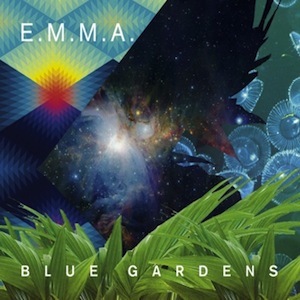E.m.m.a. Blue Gardens
The world of grime production has a long tradition of reinterpreting classical-music tropes via the […]

The world of grime production has a long tradition of reinterpreting classical-music tropes via the alien sounds of software synths and rudimentary garage beats. It’s a tendency that, to some extent at least, can probably be traced back to the videogame soundtracks that a generation of grime producers grew up with in the early ’90s—games that pillaged motifs from traditional folk songs or works by the likes of Bach and Tchaikovsky, stripping them down and refashioning them into 8-bit micro-dramas. Still, for all of grime’s emphasis on bass, beats, and MCs, at the heart of the production styles of scene stalwarts like Ruff Sqwad or Terror Danjah lies this same juxtaposition between classic melodic progressions and harsh electronic timbres. It’s this side of the genre that London-based producer E.m.m.a. plays with extensively on Blue Gardens, her gloriously colorful debut album. The LP is packed with creative chord progressions and timeless compositional flourishes, all of which are played out by an oddly alien-sounding orchestra of simplistic synth sounds. It sees E.m.m.a. pushing the naturally melodramatic tendencies of grime and garage to their extremes, and the result is certainly one of the more vivid and imaginative electronic full-lengths to be released so far this year.
A slightly streamlined VIP of E.m.m.a.’s 2012 debut single “Dream Phone” provides a fitting introduction to her vibrant sonic vision. Superficially, its composition of bubbling synth arpeggios, whip-like UK funky snares, and squelching, square-wave bass hits is the stuff of countless classic grime bangers. Yet structurally, with its rigid 3/4 rhythm and dense, almost regal-sounding minor-key melodies, the track feels rooted in the pixelated fantasy worlds of old-school RPGs just as much as it does East London pirate radio. This blending of naturally mismatched tonalities characterizes most of Blue Gardens‘ best moments. On “Marina,” for example, E.m.m.a. weaves layers of mournful, almost baroque melody over a delicately skipping garage beat to form one of the LP’s most engaging tracks. It’s a production that clearly shares its lineage with the dark releases of E.m.m.a.’s Keysound labelmates, but where her peers tend to leave space to build iciness and tension, E.m.m.a. packs the frequency spectrum with washed-out, fuzzy melodies, creating a tone that is far more placid and emotive. Similarly, on “Nostrum”—a joint venture with her production mentor Sully—E.m.m.a.’s measured and cinematic viewpoint has the noticeable effect of counteracting the more energetic and hard-hitting style of her collaborator. The result is a tune that reimagines the dramatic tension of grime as a brilliantly detached sort of slow-burning lament.
Amidst this backdrop of colorful digital soundscapes, the album’s only vocal cut, “Jahovia,” which features Michael West under his Rebel MC guise, becomes a fascinating centerpiece of the LP. While West’s toasting is relatively standard dub fare, when set against the backdrop of E.m.m.a.’s rich synth tones, the whole thing becomes totally otherworldly. The fuzzy, deeply textural nature of the instrumental is so removed from the usual echo-laden space of dub that West’s Rastafari references take on a completely new, fantastical existence and morph into something utterly removed from the continuum of either British or Jamaican music.
On the whole, there’s a pleasant sense of playfulness to Blue Gardens. While there’s little doubt that E.m.m.a. knows her stuff when it comes to grime and garage, one gets the impression that she relishes playing up to the idea of approaching the sound as an outsider. As the LP draws to a close, she begins to let things get knowingly absurd, blending nautical motifs with Amen-break drum workouts on “At Sea,” which slides into an album outro of sea-shanty accordions and overblown sound effects. Despite this slightly ridiculous coda, however, her approach to the music certainly works. As a complete package, Blue Gardens comes across as impressively well thought-out and refreshingly imaginative—it’s a bright flash of creativity in an already eccentric genre.

